|
January 22, 2020
Vigorous Defence of Education in
Ontario
More Teachers and Education Workers
Engage in Strike Action
- Laura Chesnik -
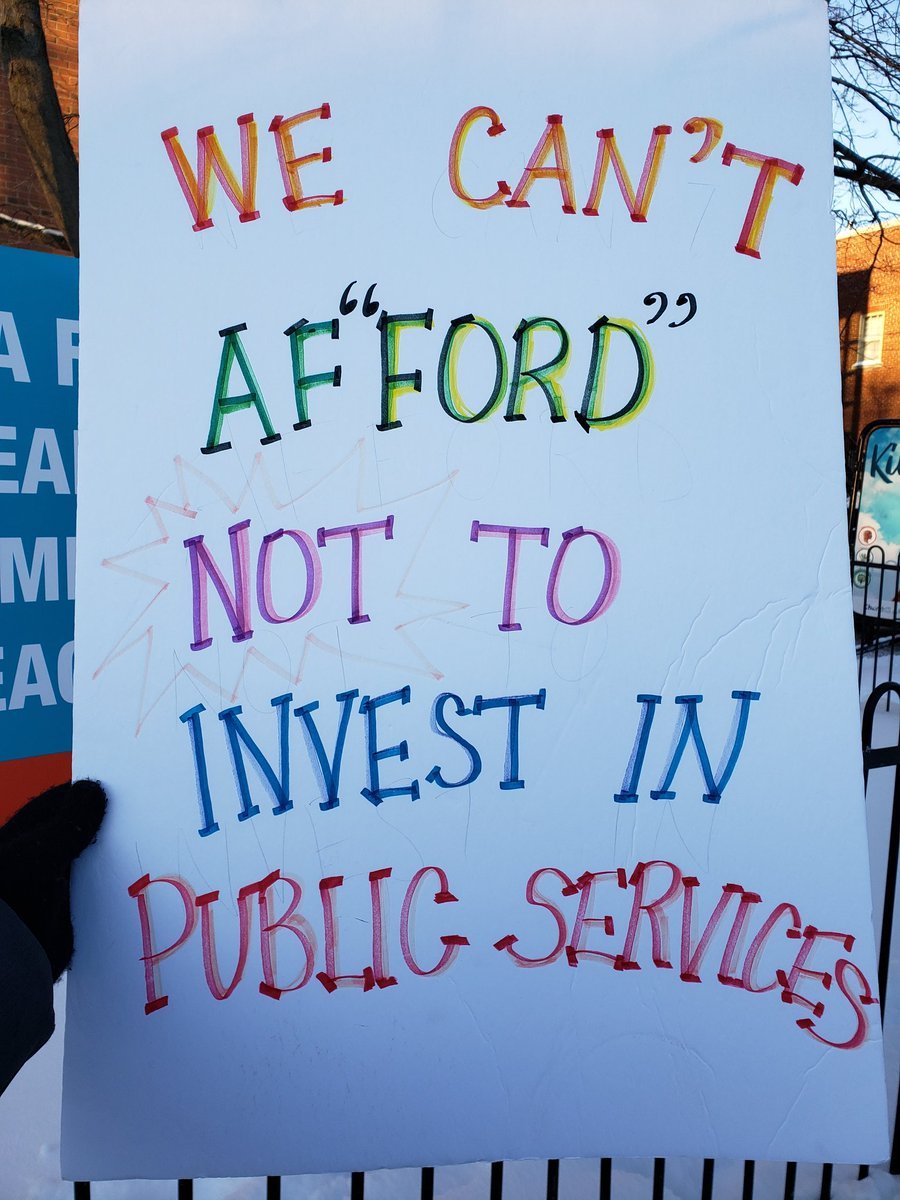  
Public Sector
Workers in Quebec Present Their Concerns and
Demands
• Support the Nurses for
Speaking Out About Deteriorating
Conditions - Pierre Chénier
• Interview, Jeff
Begley, President, Federation of Health and
Social Services (FSSS-CSN)
Workers'
Struggles Across the Country
• Lockout of Co-op
Refinery Workers in Regina
• Strike Continues at
Ledcor Technical Services Against Precarious
Work - Brian Sproule
• Montreal Airport
Refuelers on Strike Against Substandard
Conditions
Vigorous Defence of Education in
Ontario
- Laura Chesnik -

Teachers and education workers protest Premier
Ford's visit to Windsor, January 21, 2019.
Across the province on January 21, teachers and
education workers employed in the publicly-funded English Catholic
school system issued their No! to the Ford government with strike
action. This week as well, other secondary and elementary teachers and
education workers also withdrew their services in selected school
districts across Ontario as part of their unions' rotating strike
actions. It is all part of their ongoing militant resistance to the
Ontario government's neo-liberal wrecking in the education sector that
is aimed at cutting investments in K-12 education and turning the
delivery of public education into a scheme to enrich private business
interests.
Two features of these actions are of
importance:
1) The spirit of unity amongst the workers was
very strong. This is significant as the
government is banking on divisions between the
unions to try to get one of them to agree to its
anti-social provisions. The united actions, with
people joining one another's picket lines, make
it clear that the grassroots educators stand as
one and see that they are fighting for the same
thing.
2) The demands are directly targeting the Ford
government, its MPPs and Premier Ford himself.
The workers are demanding in a militant and
spirited fashion that Ford cease and desist from
his anti-social agenda. Even when he tried to
sneak unnoticed into meetings held with selected
representatives of the rich in Windsor-Essex on
January 21 he was met with a united wall of
determined educators, parents, students, nurses,
auto workers, postal workers, city workers and
many others. This unity in action is a critical
factor for the advancement of the independent
movement of the working people for investments
in public services and social programs and
respect for workers' rights.
 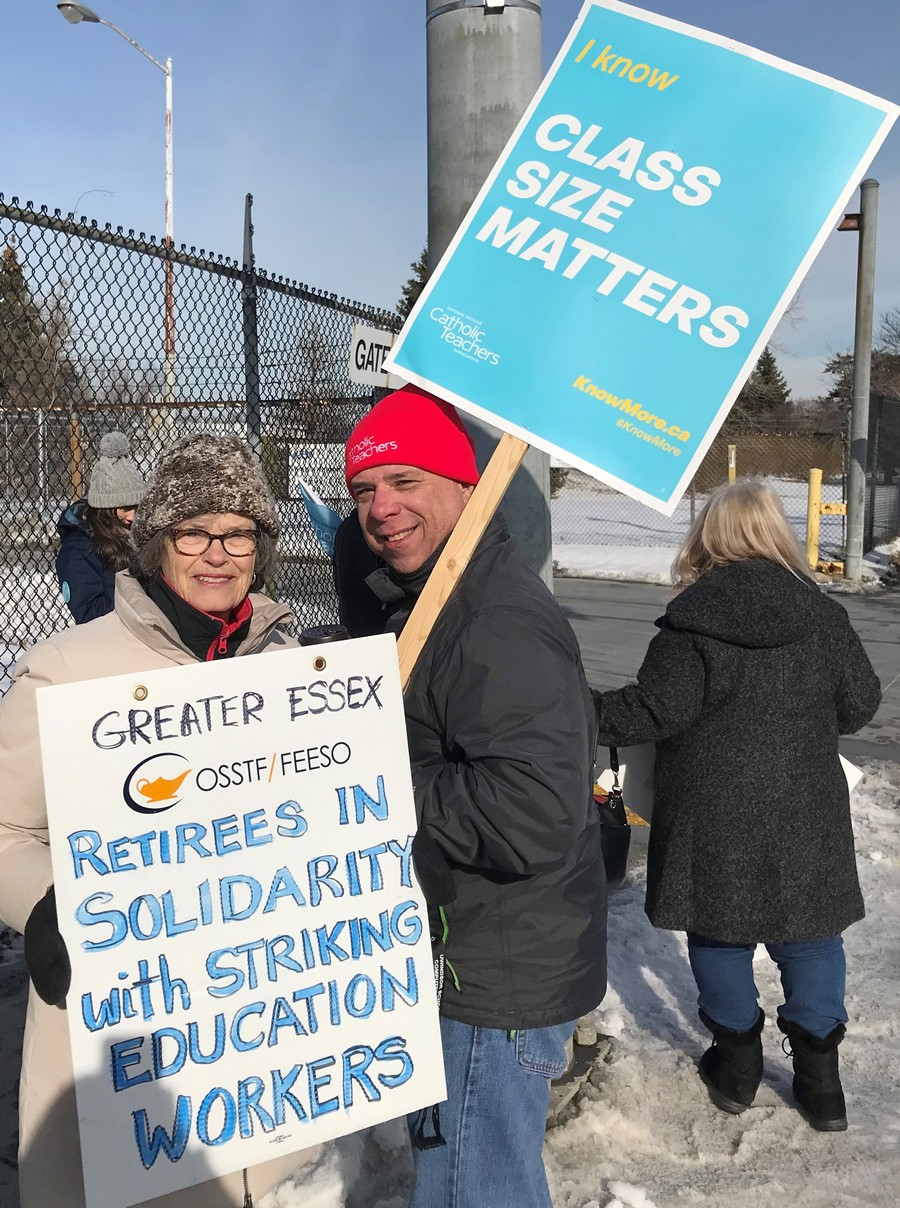
Striking Catholic teachers and supporters picket outside Ford 's
Windsor Engine Plant, one of Premier Doug Ford's stops during his
stealth visit to the area.

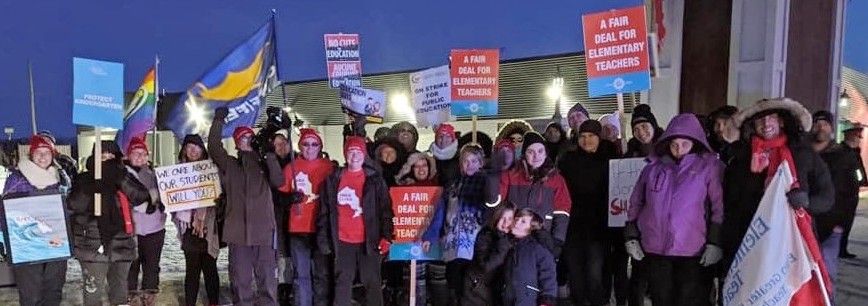
Members of all education unions were joined by workers
from other sectors at a January 21, 2020 protest rally outside a
PC Party fundraiser in Amherstburg that Ford attended
Photos of January 20-22 Actions
Ottawa Catholic School Board
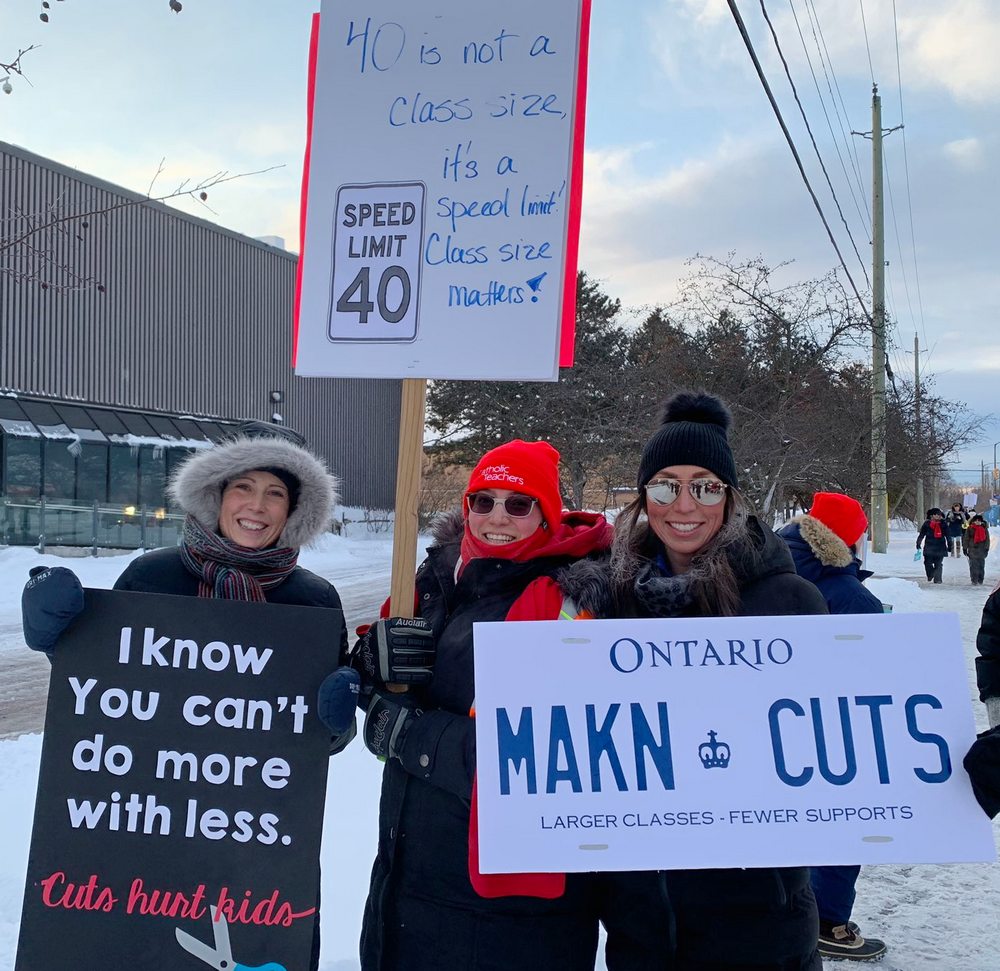 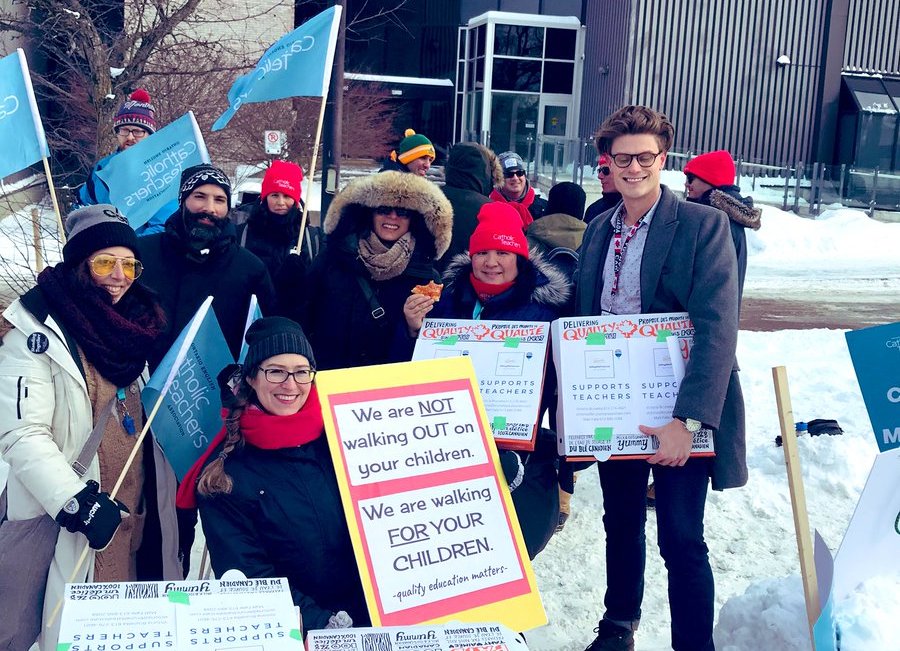
Ottawa-Carleton District School Board

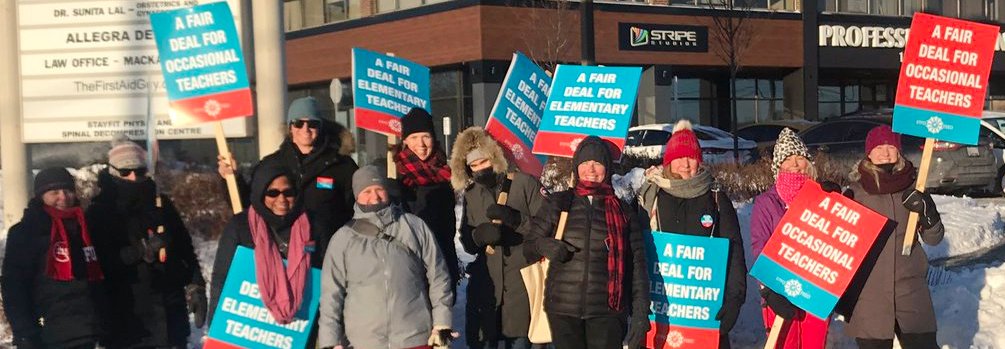
Trenton, Hastings and Prince Edward District
School Board
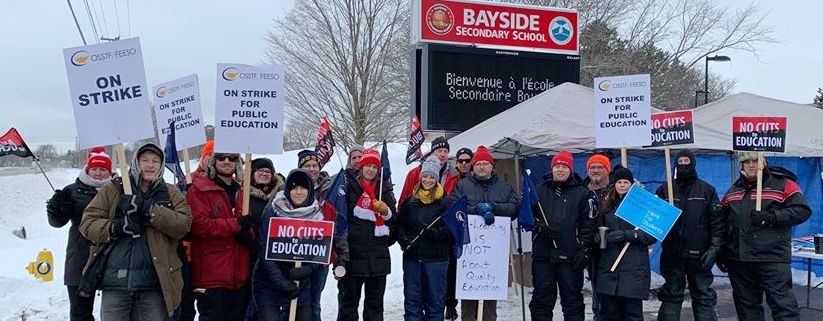
Trillium-Lakelands District School Board


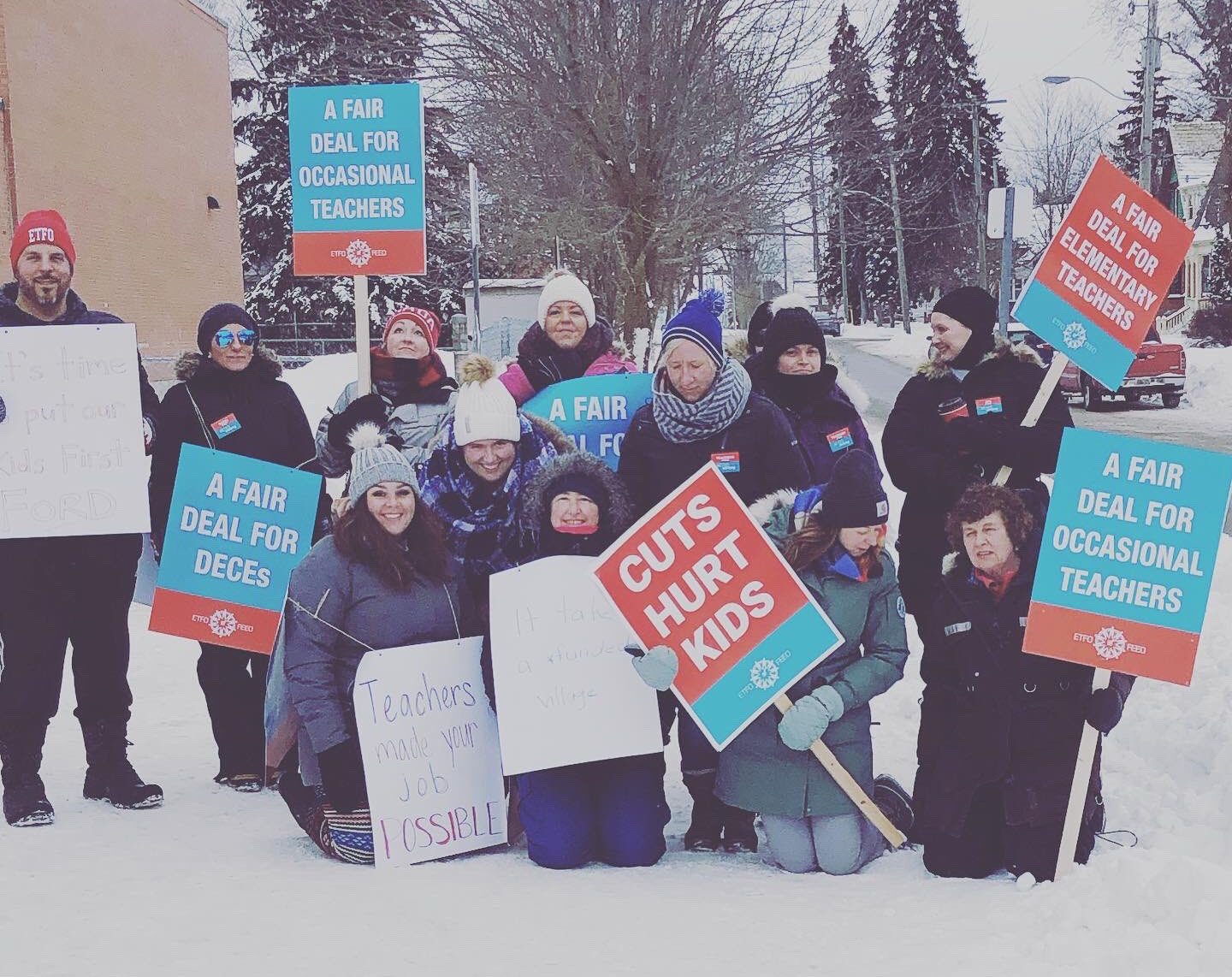 
York Region District School Board
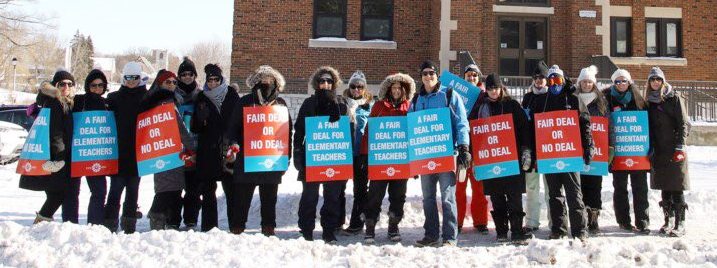

Toronto Catholic District School Board
 
Toronto District School Board
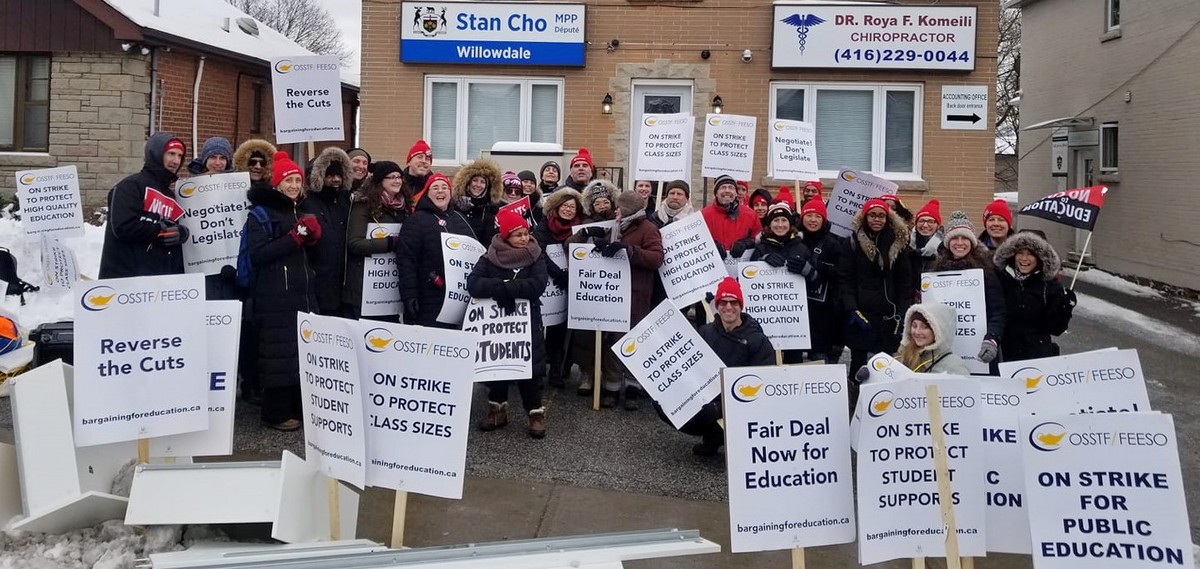

 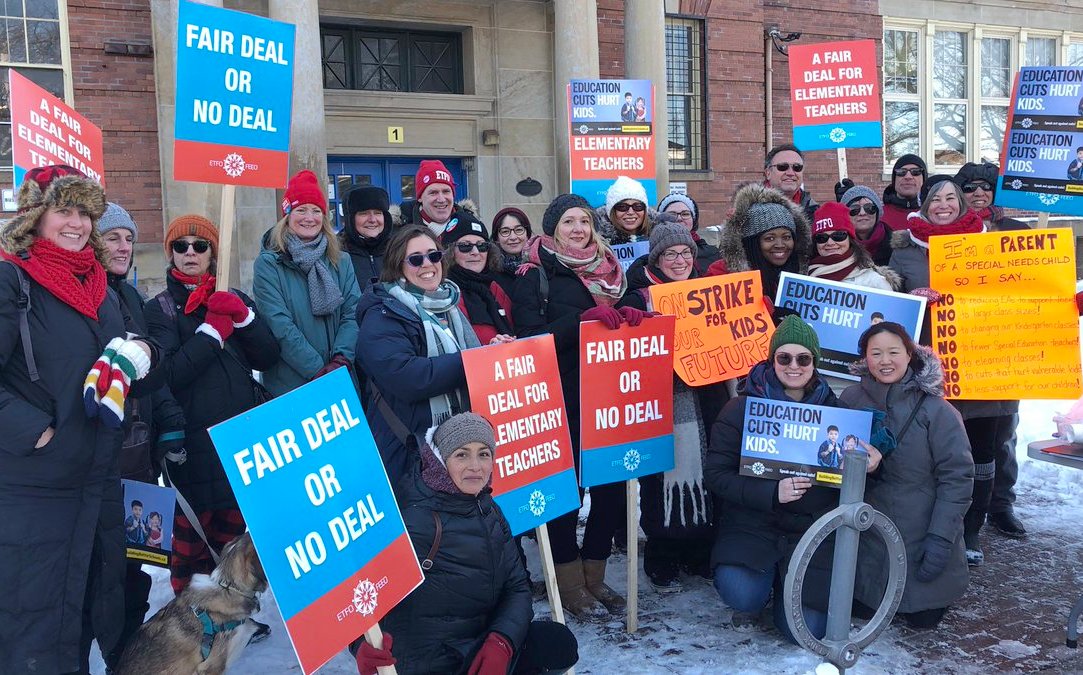


Dufferin-Peel Catholic School Board

Peel District School Board
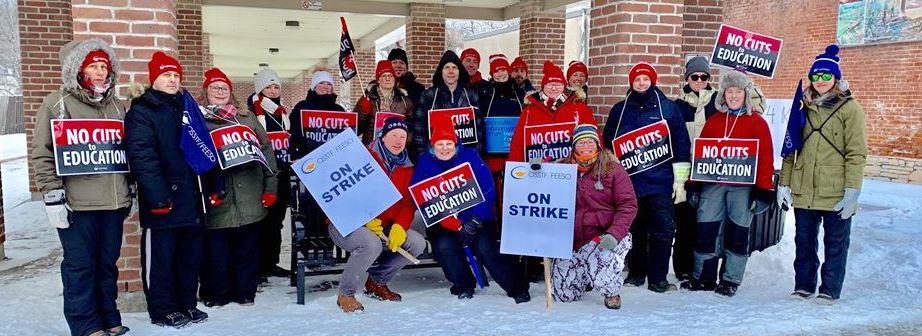
Halton Catholic School Board

Grand Erie District School Board

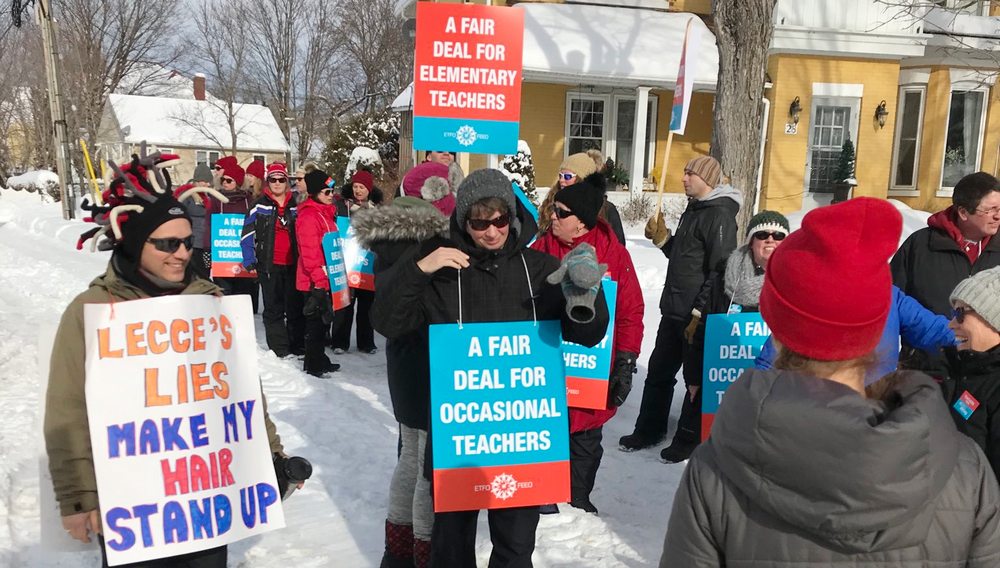
Thames Valley District School Board

 
Windsor-Essex Catholic School Board

Near North District School Board
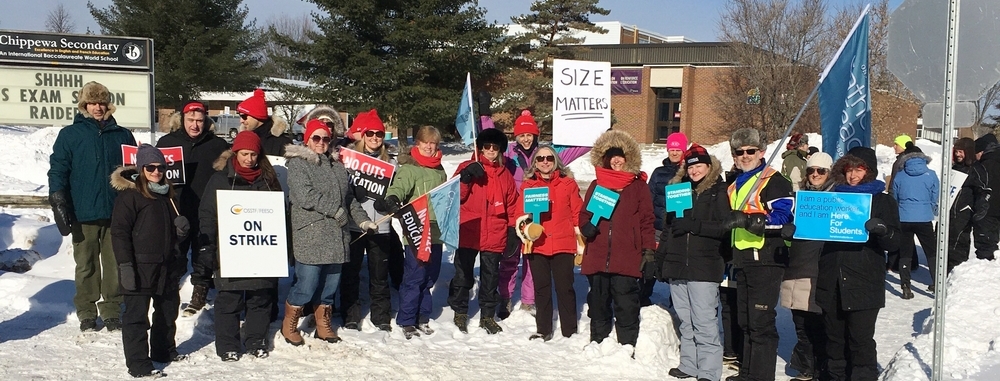
Sudbury Catholic District School Board
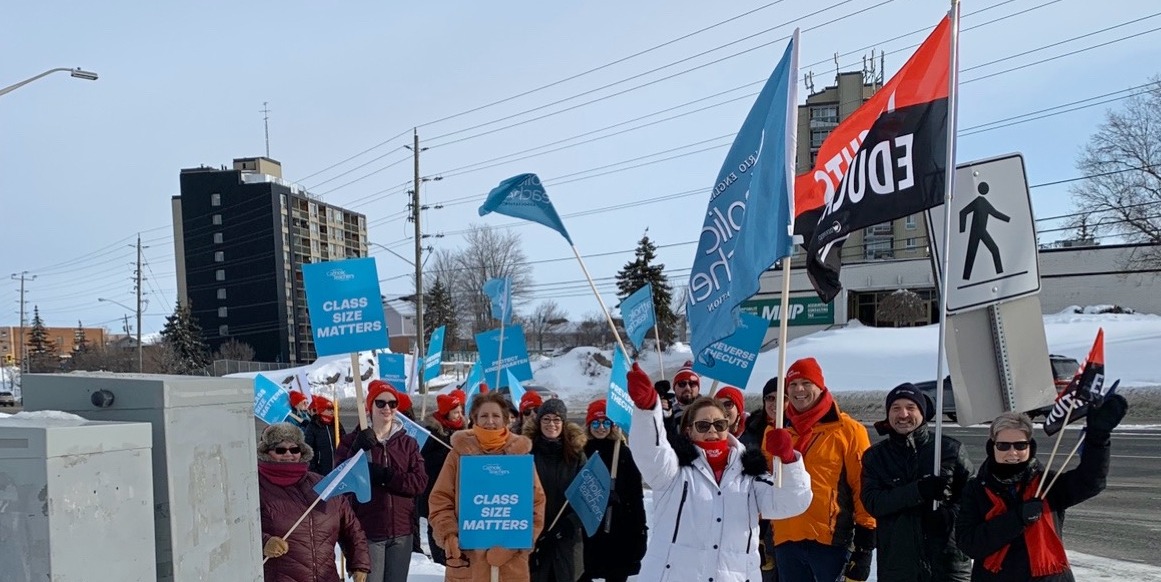
 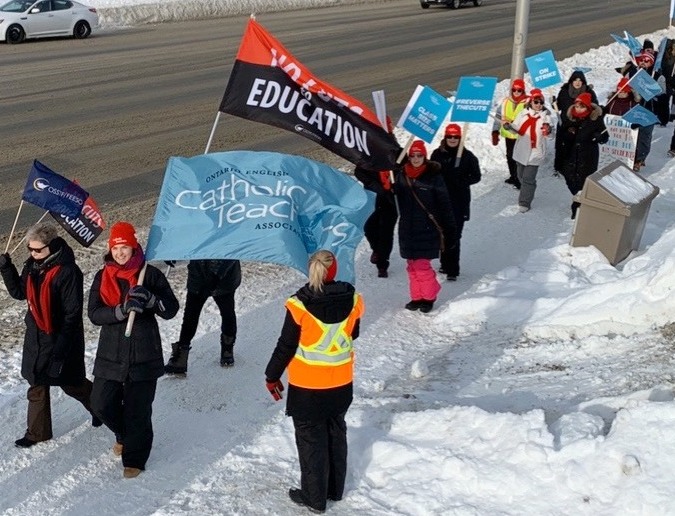
Superior-Greenstone District School Board

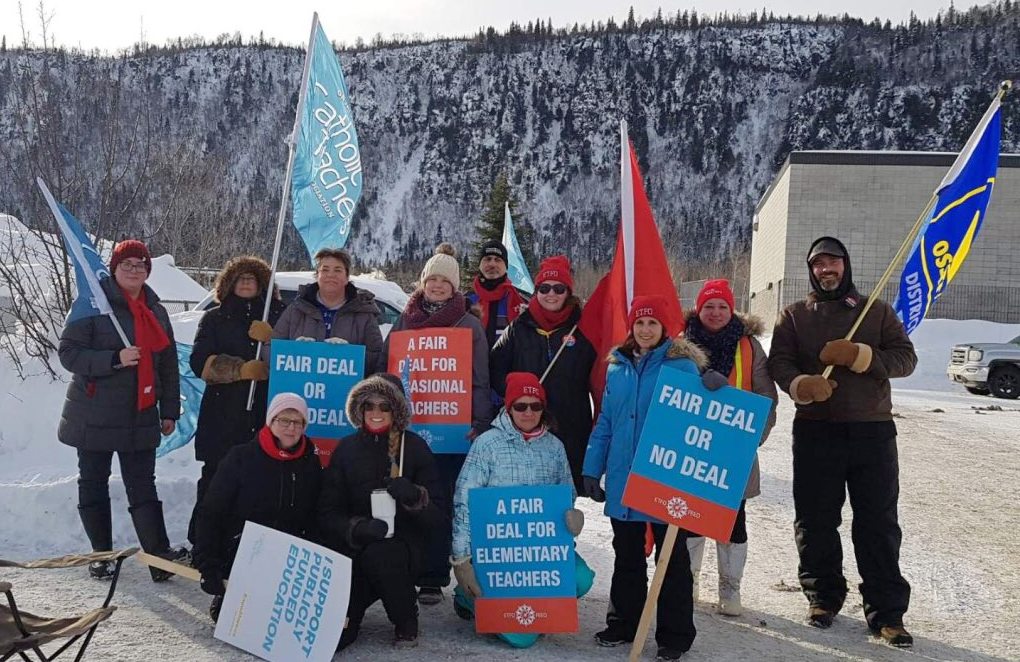

Public
Sector Workers in Quebec Present Their Concerns and Demands
- Pierre Chénier -
Disciplinary measures, including suspensions,
continue to be taken by the authorities of the
Integrated Health and Social Services Centres
against nurses who speak out publicly against
the deterioration of working conditions and
patient care within their sector.
A few days before Christmas, a psychiatric
nurse with the Integrated University Health and
Social Services Centre-University Health Centre
of the Eastern Townships was suspended without
pay for a period of three weeks for speaking out
on a social media platform against the
deteriorating conditions in his department. The
suspension was widely publicized and the nurse's
colleagues and patients collected money to make
up for his loss of income. His union, the Union
of Care Professionals of the Eastern Townships
(FIQ-SPSCE), which is part of the Quebec
Inter-professional Health Federation (FIQ) filed
a grievance against the suspension. The
President of the FIQ sent a letter to the
institution's management and to Quebec's Health
Minister, requesting that such practices --
which nurses refer to as "omerta" (a mafia code
of silence) in the health network -- be
immediately ended and that measures be taken to
significantly improve conditions in the health
sector. In particular, the FIQ is recommending
that health care professional-to-patient safety ratios be established immediately to improve
those conditions.
 It was recently
revealed that shortly before the nurse was
suspended, another nurse from the same
institution had been suspended, without pay, for
four weeks for speaking out on social media.
According to news reports, the nurse requested
that the suspension not be publicized. According
to the FIQ, this is the first time that
suspensions without pay have been implemented at
the regional establishment. Neither of the
nurses received any verbal or written warning, or other
graduated measure in their file prior to their being suspended without pay. It was recently
revealed that shortly before the nurse was
suspended, another nurse from the same
institution had been suspended, without pay, for
four weeks for speaking out on social media.
According to news reports, the nurse requested
that the suspension not be publicized. According
to the FIQ, this is the first time that
suspensions without pay have been implemented at
the regional establishment. Neither of the
nurses received any verbal or written warning, or other
graduated measure in their file prior to their being suspended without pay.
It has also been revealed that the
establishment's authorities require that, as a
condition of employment, all new employees sign
a form entitled "Agreement on Confidentiality,
Information Security and the Maintaining a
Healthy Work Environment."
According to the media, several of the
document's clauses relate to patient record
confidentiality, with articles taken from the Act
Respecting Health Services and Social Services
and the Act Respecting Access to Documents
Held by Public Bodies and the Protection of
Personal Information. One clause also
requires that all new employees make the
following commitment: "Not to disseminate to the
media and social networks (Facebook, Twitter,
etc.) any information that goes against the
interests of the establishment, any confidential
and sensitive information on the CIUSSS de
l'Estrie-CHUS."
Management issued a press release in which it
affirms that the form "is a tool of the
establishment to make sure that employees are
aware of the obligations coming from all
sources." It states that "employees are
completely free to express themselves publicly
as long as the initiative is taken in full
respect of patients, their families and
colleagues."
The measures being taken to criminalize nurses and other
health care workers for upholding their professional duty to defend the
integrity of their working conditions are unacceptable. Making
employment conditional on signing clauses which compromise one's
conscience is equally unacceptable. More and more places are claiming
that they are defending their "brand," their "reputation" and that when
workers speak out about their working conditions it harms their
reputation. This can only be for insidious purposes given that it is
the employers which are primarily responsible for working conditions,
not the workers who can only uphold what is already there. On top of
this, the employers act in a manner which undermines the unions. They
tend to take on employees one-on-one and each employee is left to fend
for themselves to deal with intimidation and their defence.
 The
anti-social restructuring of the health care system is systematically
destroying the channels that allowed health workers to be represented
by their unions. Establishment administrations are under the
direct control of the Minister of Health and are subject to legal
requirements to balance their budgets which require that they make
cuts. Should they not do so they face the penalty of being dismissed by
the Minister. With
the centralization of powers in the hands of the Minister in the
service of private interests, the former channels of
communication and conflict resolution have been destroyed.
Anarchy and violence in the form of abuses of all kinds are
imposed on the health system. This leaves nurses and other
health care personnel no other option than to act outside
such channels, to which the authorities respond with repression.
Nurses take no pleasure in holding hospital
sit-ins or resorting to social media in exasperation, to speak
out and break the silence on their conditions. The
anti-social restructuring of the health care system is systematically
destroying the channels that allowed health workers to be represented
by their unions. Establishment administrations are under the
direct control of the Minister of Health and are subject to legal
requirements to balance their budgets which require that they make
cuts. Should they not do so they face the penalty of being dismissed by
the Minister. With
the centralization of powers in the hands of the Minister in the
service of private interests, the former channels of
communication and conflict resolution have been destroyed.
Anarchy and violence in the form of abuses of all kinds are
imposed on the health system. This leaves nurses and other
health care personnel no other option than to act outside
such channels, to which the authorities respond with repression.
Nurses take no pleasure in holding hospital
sit-ins or resorting to social media in exasperation, to speak
out and break the silence on their conditions.
Workers' Forum
condemns these repressive measures that are a product of the
neo-liberal wrecking of the public health care system and
calls on Canadians to unite with the workers to find solutions
to improve working conditions and patient care, first and
foremost by supporting their right to speak
out. The nurses and others are clearly defending
the public interest by doing so and must know they
are supported in rejecting the unacceptable practice of being
forced to sign loyalty oaths.

Workers' Forum: The FSSS-CSN
recently presented its sectoral demands for the
renewal of the collective agreements of its
members. What is their thrust?
Jeff Begley: We have demands in
terms of work organization. Since the reform of
the health care system carried out by the
previous Liberal government, we have witnessed a
fairly significant disorganization. With regard
to work organization, a much more serious
dialogue is needed than what has transpired in
the past.
One of the symptoms of disorganization is the
mandatory overtime that we are intent on ending.
We're tackling a situation where employers are demanding
that workers increase their availability, even though this results in
discouraging them. As a result of the creation of mega-establishments,
the unions are now huge. There are regions where an establishment can
cover hundreds of kilometres. Even within Montreal, the area can be
spread out between Pointe-aux-Trembles to Maisonneuve-Rosemont
hospital, which is a very wide area. There are employers who are
demanding that workers make themselves available everywhere, on
different shifts. In 2020, it's amazing that someone can be made to
work three shifts in rotation -- the day, evening and night shifts --
over a period of a few weeks, sometimes in various locations. It
doesn't make sense. That's not the case everywhere, but there are
places where employers continue to demand full availability on three
shifts. It's very detrimental to one's physical and mental health. That
has to be addressed. If you want to encourage people to work, you have
to give them the opportunity to work in a stable environment, even if
they are on the recall list. Enough jobs exist for that. The
practice of workers being used as pawns that can be moved around at
will must stop. It is necessary to ensure that there are enough workers
on the floor, which is how we can ensure that mandatory overtime,
amongst other problems, is eliminated.
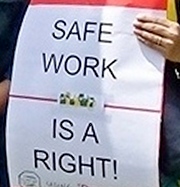 Another very
important point is the issue of health and
safety at work. There are departments and places
where over a quarter of the staff is on leave,
either because they are sick or on compensation
from the Labour Standards, Pay Equity and
Workplace Health and Safety Board (CNESST). In
many places, this is not the exception. If we
could cut that in half, suddenly the problem of
staff shortages would be greatly reduced. Another very
important point is the issue of health and
safety at work. There are departments and places
where over a quarter of the staff is on leave,
either because they are sick or on compensation
from the Labour Standards, Pay Equity and
Workplace Health and Safety Board (CNESST). In
many places, this is not the exception. If we
could cut that in half, suddenly the problem of
staff shortages would be greatly reduced.
At the sectoral table, we have a lot of health
and safety demands. At the same time, we are
asking the government and the CNESST to ensure
that health and social services are recognized
as a priority group by the CNESST. This is not
the case at the moment although health and
social services are one of the groups with the
highest rate of accidents and occupational
diseases. Being recognized as a priority group
would mean that compulsory prevention committees
would be established, with workers freed up
full-time to do prevention. Problems must be
eliminated at their source. The committees that
currently exist in our sector are empty shells.
There's no prevention and no results. We're
intent on finding the cure. In addition,
employers are systematically contesting workers'
claims. It's one of our top priorities. If we
fail to obtain priority group status with the
CNESST, we're going to insist on incorporating
all the elements specific to a priority group in
the collective agreement.
WF: Several unions have expressed
concerns that seem to be emerging as a result of
the sectoral approach of the government and the
management negotiating committees. What's your
take on this?
JB: Yes there are things that
worry us.
We had thought that during the last local
negotiation employers were beginning to
understand that their demand for flexibility at
all costs was detrimental. However, through the
language they're using, the demand for
flexibility keeps coming back.
In our sector, for example, less than 40 per
cent of care attendants are full-time. We had
asked that measures be put in place to convert
part-time positions into full-time jobs. But
that work has not been done everywhere or in the
same way in all places. Furthermore, because of
mandatory overtime, many have not applied for
full-time positions. Employers claim they have
done the necessary work but that people did not
participate in the project. In fact, if people
are reluctant to apply for full-time jobs, it's
because of the mandatory overtime. This is the
case for nurses, in particular, who say that if
they remain part-time and are forced to do
mandatory overtime, at least they'll not be
forced to work all the terrible hours that
full-time nurses are required to work.
I must point out that for us, things are still
not entirely clear as to the intentions of the
government and the management committees, when
they raise the need for flexibility. It remains
somewhat vague. But that's our concern.
In conclusion, I want to say that although
money is important, if we get better wages but
our conditions don't improve, we won't be able
to attract people to come and work in our
sector. Of course it's necessary to invest and
improve wages substantially, but that alone is
not enough.

Workers' Struggles Across the
Country
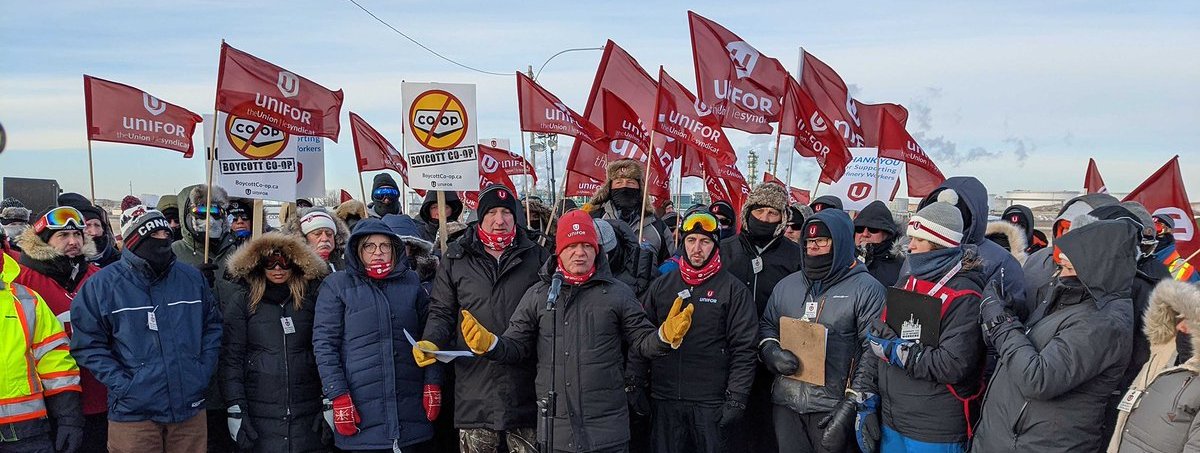
Several hundred workers rallied with locked
out Co-op Refinery Complex workers on their
picket line on January 20 and 21 in Regina. They
came from as far away as Gander and Vancouver,
and included members of the national executive
of Unifor.
The mass action controlled all movement in
and out of the refinery. Regina police responded
by arresting 14 individuals including Unifor's
National President and its Western Regional
Director, claiming that an injunction naming
Local 594, which imposed the condition that
picketers could only stop trucks for 10 minutes,
also applies to Unifor executives and members
from other locals.
The more than 800 workers at the Co-op Refinery
Complex (CRC) of the Federated Co-operatives
Limited (FCL) in Regina were locked out on
December 5, 2019. The lockout was imposed by the
company in response to the union's 48-hour
strike notice issued on December 3, 2019. The
workers, members of Unifor local 594, had been
in negotiations, then mediation, for several
months during which FCL, contrary to the
commitment made in previous negotiations,
insisted on replacing the existing defined
benefit pension plan with an inferior plan. The
workers justly stood firm in defence of their
pension plan, a plan that had been agreed to as part of previous contract
negotiations.
Throughout the lockout the company has issued
media advisories, put up billboards, and made
every effort to portray their position as "fair"
and the workers' claims unreasonable. Their
claim of "fairness" is based on the company's
position that workers should have to
"contribute" to their pension plan. The current,
previously negotiated arrangement, is that the
company funds the defined benefits plan. What is
not mentioned in the context of "fairness" is
that the amount that the company puts into the
pension plan was negotiated in the past and
forms part of the compensation package, along
with wages, vacations, sick leave, etc. that the
workers agreed to accept in exchange for their
labour which creates the company's wealth. FCL
is appealing to 'public opinion' to recognize
that times have changed, fossil fuels are on the
way out, that in order to be 'sustainable' the
company will deny the workers what is theirs by
right as the producers of wealth in order that
its profits continue to increase.

Rally January 20, 2020 in Regina in support of
Co-op Refinery workers.
The workers have responded with a resounding No! Throughout the lockout there have been actions
by workers in communities throughout
Saskatchewan and as far west as Vancouver Island
in support of the refinery workers, including a
boycott of Co-op retail outlets.
The refinery is continuing to operate with
"replacement workers," management and scabs. The
company actually built a work camp for scabs
months before the strike notice in preparation
for the lockout, so as to continue production.
In a letter dated January 20, responding to a
letter from the National Farmers Union (NFU) appealing
for a return to negotiations to settle the
dispute, FCL boasts that they implemented this
plan as far back as October 2019. In their
letter of January 17, the National Farmers Union
writes, "It is disturbing that a key issue in
the dispute is whether workers will be able to
use the pensions previously agreed to through
collective bargaining and earned during their
careers at the refinery, or if they will be
forced to accept one that is less valuable. A
roll-back in pensions is an issue for the whole
community: reneging on the pension promise is a
way for companies to transfer a portion of money
earned by the workers into the company's assets.
If Co-op succeeds, other companies will be
emboldened to seize their workers' pension
funds." The company's response, besides the
claims that the pension fund must change and
that the workers are already highly paid,
outlines what it calls the "business continuity
plan." They say "[...] we understand the
criticality of the CRC's fuel supply to the
Western Canadian economy as a whole, and to
agricultural producers in particular. That is
why the Board supported management's
determination to have an effective business
continuity plan (BCP) in place to ensure safe
and reliable fuel production in the event of any
potential interruption to production and
supply."
The NFU noted that "It is also disturbing to
learn that Co-op management had prepared for a
lengthy lock-out by building a work camp to
house scabs, and has been spending resources on
helicopter flights to transport scabs across the
picket line. Co-op management has apparently
invested heavily in measures designed to prolong
the dispute." FCL responded that "Again, it is
worth noting that the CRC did not commence
construction of business continuity facilities
on-site until the final, Unifor-driven break
down of mediation in October." (WF
emphasis.)
The fact that the employer had a plan in place
to undermine the workers' struggle months in
advance of the strike notice only strengthens
the determination of the Co-op Refinery workers
to defend their existing working conditions,
particularly their pensions. This just stand
deserves the support of all Canadian workers.
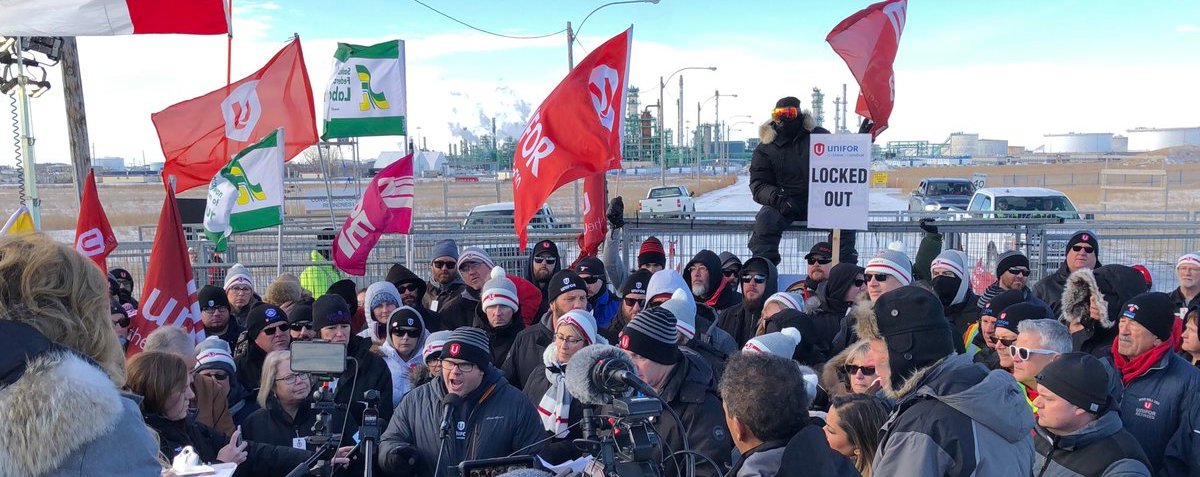

- Brian Sproule -
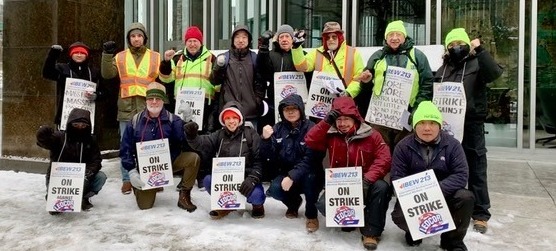
IBEW Local 213 retirees picket Ledcor offices in
Vancouver, January 17, 2020.
Telecommunications workers, members of the
International Brotherhood of Electrical Workers
(IBEW) Local 213, are continuing their strike
against Ledcor Technical Services (LTS) in Port
Coquitlam.
The workers walked off the job on September 30,
2019 following the mass layoff of 31 workers
without cause or notice. They joined Local 213
in 2017 hoping to improve their working
conditions, including an end to piece work and
contracting out of their jobs as well as
recognition of their seniority rights.
During the two years since the IBEW was
certified as the bargaining agent, LTS has
refused to sign a first contract or agree to any
of the workers' just demands. The regular work
force has continued to decline from 238 at the
time of certification to barely half that number
today.
On January 14, a team from the Workers' Centre
of CPC(M-L) joined striking workers and Local
213 Retired Members' Committee in picketing
Ledcor Group's head office in downtown
Vancouver. An article from the December 19, 2019
issue of Workers' Forum on the strike
was distributed to the other picketers.
The Workers' Centre was told that Telus, one of the
other large corporations in the telecommunications industry, is
co-operating with Ledcor in hopes of breaking the strike, de-unionizing
the industry, and ensuring that all installation work is done by
contractors designated as self-employed and thus not subject to labour
standards legislation regarding wages, overtime, breaks, health and
safety, compensation for on the job injuries, etc.
Besides picketing LTS and Ledcor head office
the workers are sending out flying squads of
picketers armed with signs and bull horns when
they learn of LTS contractors installing fibre
optics.
Despite financial pressures and their small
numbers the workers are determined to fight
until they win an acceptable first contract.
Abour Ledcor
Ledcor's website states "Ledcor is a
diversified construction company, working to
design, build, transport, operate and maintain
projects all over North America."
Leduc Construction was founded in 1947 by
William (Bill) Lede. It began by building roads
for the oil industry near Leduc, Alberta.
Bill Lede died in a construction site accident
in 1980. His sons Dave and Herb took over
operating the company. Dave Lede is chairman and
CEO.
In 1982 the company was renamed Ledcor. Wikipedia
says that Ledcor is "employee owned."
Headquarters are in Vancouver and San Diego,
California with some 30 offices and about 7,000
employees across North America. The company net
worth is about $1 billion.
There are 10 divisions:
- building
- oil and gas including pipeline construction
- forestry
- mining
- communications (Ledcor Technical Services)
- transportation including aviation and marine
subsidiaries
- power
- properties (real estate and development)
- infrastructure
- environmental


Striking airport refuelers rally in Montreal,
January 16, 2020. (IAMAW
Canada)
The workers who refuel all the planes at
Montreal's Pierre-Elliott-Trudeau and Mirabel
airports have been on strike since December 31,
2019. These roughly 100 workers, who are members of
the International Association of Machinists and
Aerospace Workers (IAMAW) Local 2301, refuel
about 500 planes a day. Their collective
agreement with their employer Swissport Canada
Inc., expired in August 2019; negotiations for a
new contract began May 23, 2019.
On December 28, 2019, the workers who voted on
a tentative deal rejected it by 90 per cent.
This followed an earlier vote of 99 per cent in
favour of a strike mandate.
Swissport International AG is one of the
world's largest airport ground services and air
cargo handling monopolies. Swissport was
subcontracted for refueling services by the
Canadian Consortium of Air Carriers (of which
Air Canada is a member) in 2015. The consortium
favoured Swissport over U.S.-based CAFAS which
had been the subcontracted refueler for many
years.
Subcontracting of ground services and other
services is common practice. Service providers
compete to be the lowest bidder and the air
carriers see this as a great advantage for them,
profit-wise. As well, subcontracting enables
them to deny any social responsibility to the
workers providing the services and to the
public.
The strike at the Montreal airports raises the
issue of "contract flipping," which is becoming
more and more common at Canadian airports. It is
a major tool used by employers to wipe out union
rights and impose lower wages and working
conditions to increase their private profit.
When contracts are "flipped" to a new service
provider, workers must re-apply for their jobs.
The new employer is not bound to recognize
seniority or the workers' union, nor is it
required to maintain the wages or benefits
previously won by the workers who are forced to
start from scratch. It is one of the ways in
which workers are pushed into precariousness
with pay that is close to minimum wage with few,
if any, benefits.
The airport workers who are affected by this
contract flipping deliver a crucial service that
impacts the safety of airline passengers, other
workers and the general public. They refuel
planes, often in extreme hot or cold
temperatures, on airport grounds that are more
and more clogged with planes and heavy
equipment, while exposed to loud noise and other
hazardous conditions. Airport workers in
Montreal, as well as Toronto Pearson Airport
workers, are waging a determined fight against
this practice.
The flipping of the contract between CAFAS and
Swissport led to a straight loss of wages of
about 33 per cent, a reduction from $24 an hour
to about $16 an hour. Their paid vacation time
dropped from five to two weeks. They lost their
company pension plan and most of their benefits.
Most importantly, because of the untenable
working conditions, there is a huge staff
turnover. This in turn affects safety of the
workers, passengers, crew and the general public
because companies then rapidly hire new workers
who receive minimal training. Accidents on the
tarmac are on the increase.
With their strike, airport workers are saying
that "Enough is Enough!" They are going public
with their demands and their experience. On
January 15 they held a rally in front of the
Swissport Main Office in Montreal which was
attended by the striking workers, other workers
and union representatives. They presented their
demands for a significant improvement in their
wages and working conditions so as to stop staff
turnover. They demanded adequate training for
all employees. They demanded that Transport
Canada and the federal government intervene to
stop the reckless contract flipping by amending
the Canada Labour Code so that union
rights are maintained when a new employer is
awarded a contract, and that already negotiated
wages and working conditions are maintained with
the new employer. They demanded that the Labour
Code forbid the use of scabs in labour
disputes. They opposed the current trend of the
monopolies, with the assistance of the
government, to make airports a paradigm of
precariousness and substandard conditions.
Several of the unions that participated offered
financial support and pledged funds from their
locals to help the workers win this fight.
The practice of Transport Canada of turning a
blind eye to the wrecking of working conditions
and safety standards in Canadian airports is
"explained" with the self-serving argument that
airport governance changed in Canada in the
1990s so that airports are no longer owned and
operated by the federal government. As far as
the Montreal airports are concerned, Transport
Canada retains ownership but an independent
entity has been created to operate them.
Transport Canada has reduced itself to being
a mere observer of deregulated airport
authorities and carriers, as is the case with
the railways, rather than a public authority
that upholds standards and regulations.
According to Transport Canada, contract flipping
by the airport authority and the carriers to
impose substandard conditions and jeopardize
safety is a purely private business matter. The
only responsibility that Transport Canada
acknowledges is to rubber stamp the reports that
they produce. This is putting airport workers
and all Canadians at risk and must not pass.
The strike of the airport workers in Montreal
is courageous. It is a fight for their rights
and for the rights and safety of all. It must be
vigorously supported by all workers.

(To access articles
individually click on the black headline.)
PDF
PREVIOUS ISSUES
| HOME
Website: www.cpcml.ca
Email: office@cpcml.ca
|

